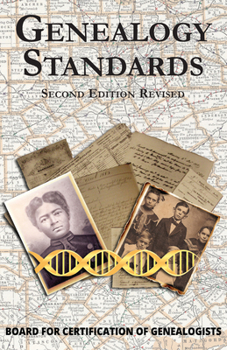Genealogy Standards Second Edition Revised
Select Format
Select Condition 
Book Overview
Family historians depend upon thousands of people unknown to them. They exchange research with others; copy information from books and databases; and write libraries, societies, and government offices. At times they even hire professionals to do legwork in distant areas and trust strangers to solve important problems. But how do family historians know they are producing or receiving trustworthy results? This official manual from the Board of Certification for Genealogists, essentially a users' guide for family historians, provides standards for genealogical researchers to assess their own and others' work. The revised second edition increases the clarity of DNA and privacy standards. Those standards are especially useful in the twenty-first century, when many genealogists use a complex new tool-DNA testing-and trace living people more often than they did in the past.
Related Subjects
Reference












